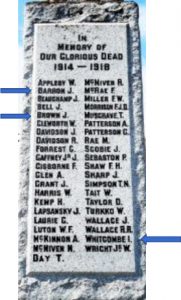The Great War 1914-1918
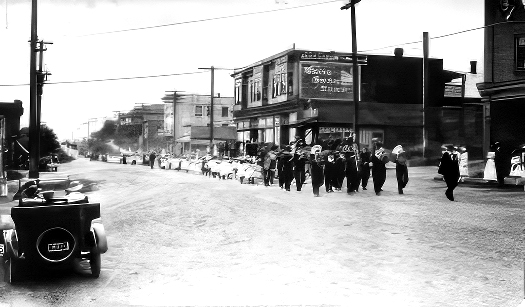
A Brass band leads a Dominion Day (July 1st) parade down First Avenue in Ladysmith during the First World War, 1916.
When war was declared against Germany on August 4th, 1914, Ladysmith was suffering through a long-lasting and very bitter coal miners’ strike, which divided the community.
The miners’ union running out of money (and thus not being able to provide strike pay), coupled with patriotic fervour, resulted in the strike ending two weeks after the outbreak of war.
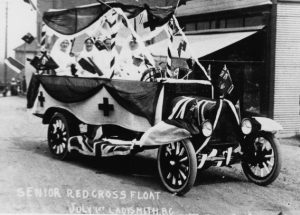
Red Cross float in a Dominion Day (July 1st) parade in Ladysmith during the First World War. Date: circa 1917.
The war offered a chance to get away from it all. It wasn’t going to last long, they thought – so better sign up fast, get some pay away from the nastiness of the strike and have some excitement!
As we know now, it was not to be over so quickly…
Patriotic Songs
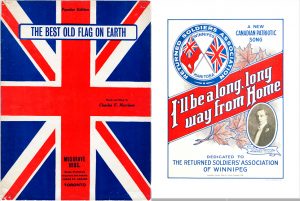
Covers to sheet music for two patriotic First World War songs sung in 1917 at a Cowichan Valley cadet concert.
Patriotic songs celebrated the Canadian troops, boosted war morale and encouraged public support. A concert in 1917 put on by the Cowichan Valley Cadets featured patriotic songs such as “The Best Old Flag on Earth”, “I’ll be a Long, Long Way from Home”, and “Do Your Bit”. Dominion Day (July 1st) parades were accompanied by brass bands and featured floats decked up in patriotic flags – one in Ladysmith in 1918 featured a mock-up of an armoured car towing an artillery piece. The government sold Victory Bonds to raise $150 million for the Canadian war effort. There wasn’t a week without numerous dances, sales of needlework, teas, raffles or any other means of raising money to support the war.
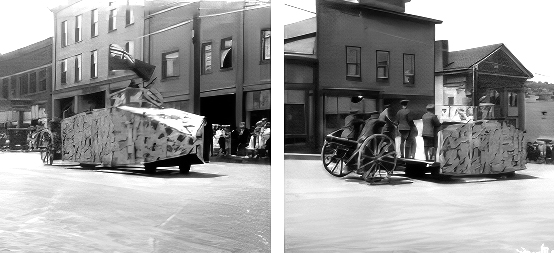
Coming and going views of the 1918 Dominion Day Parade float mock-up of an armoured car towing an artillery piece.
On November 12th, 1918, after the announcement of Germany’s surrender, there was a parade from the post office through the town. The Ladysmith Chronicle dourly noted that among the celebrants, “quite a few appeared to have imbibed freely of intoxicants. Of course, it is not probable that there were any under the influence of liquor, for since prohibition was enacted, there has been no red-eye sold in Ladysmith.”
Between 1914 and 1918, some 410 men from Ladysmith served – from a community of 4500. At least 41 perished and are commemorated on the town Cenotaph. Three of these were noted local musicians and are identified on the image to the left. The town continues to honour the memory of those fallen in conflict defending our rights and freedom.


